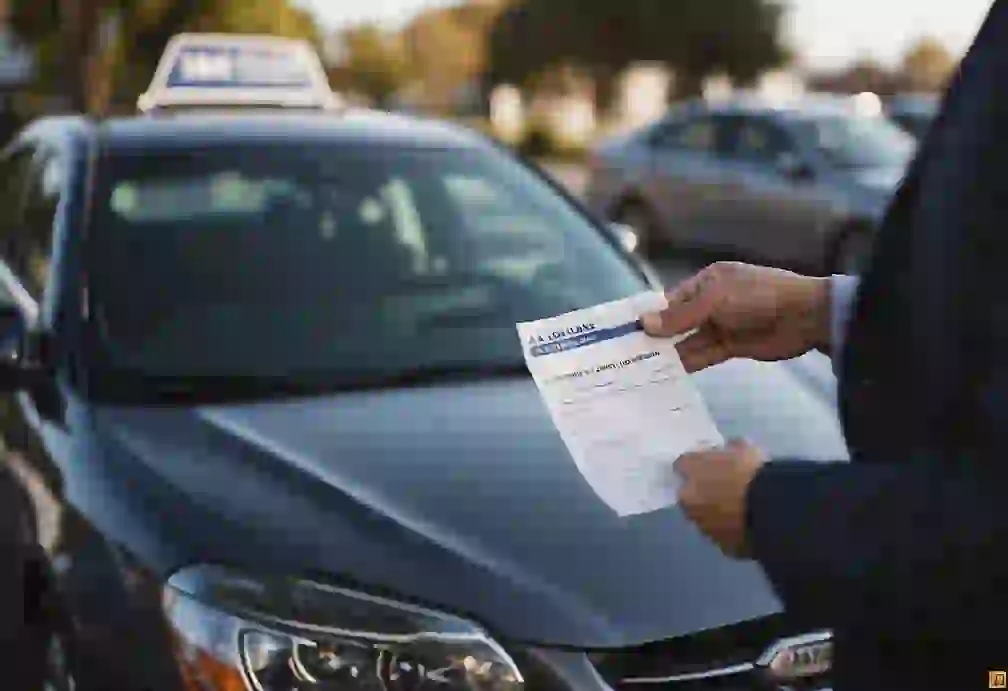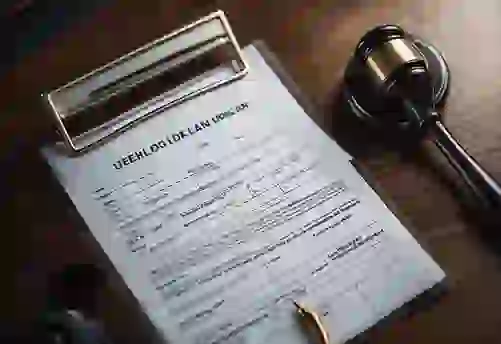Car Title Loan Lien: Essential Facts and How to Navigate
Car title loans are a quick way to secure cash by using your vehicle as collateral. These loans are often beneficial for those who need immediate financial assistance but have a less than stellar credit history. However, navigating the world of car title loans can be confusing, especially when dealing with liens and the responsibility of lien holders. A lien on a car title represents the legal claim of the loan provider on the vehicle. Essentially, the lender, also referred to as the lienholder, retains certain rights over the car until the loan is fully paid off. For borrowers, it’s important to understand these rights and responsibilities in order to manage the loan effectively and avoid any potential pitfalls.
A lien on a car title represents the legal claim of the loan provider on the vehicle. Essentially, the lender, also referred to as the lienholder, retains certain rights over the car until the loan is fully paid off. For borrowers, it’s important to understand these rights and responsibilities in order to manage the loan effectively and avoid any potential pitfalls.
Key Takeaways
- Car title loans offer fast cash for vehicle owners but involve dealing with liens and lienholders
- Understanding the rights and responsibilities of a lienholder is crucial to managing a car title loan effectively
- State laws and regulations also play a significant role in the car title loan process, especially when it comes to liens and selling the vehicle
Understanding a Car Title Loan Lien

What Is a Car Title Loan?
A car title loan is a type of short term loan, where you temporarily give your car’s title to a lender as collateral. In exchange, the lender provides you with funds that must be repaid, usually within 30 days. This loan allows you to utilize your car’s value without having to sell it. While these loans can provide quick access to cash, they may come with high interest rates and fees, so it’s essential to understand how they work before making a decision.How Liens Affect Car Title Loans
When you take out a car title loan, the lender usually places a lien on your vehicle. This lien acts as a legal claim, providing the lender with a security interest in the vehicle until the loan is fully repaid. As long as the lien remains on your car, the lienholder has a right to possess or sell the vehicle if you default on the loan. To secure their interest in the car, the lender becomes the lienholder and is listed on the car title with your state’s transportation agency or department of motor vehicles. Upon full repayment of your loan, the lien is lifted, and the lender will release the title back to you. Before taking out a car title loan, consider the following:- Interest Rates: Car title loans often have significantly higher interest rates than traditional loans, which may lead to greater financial strain during repayment.
- Repossession Risk: If you default on the loan, the lender has the right to seize your car as collateral. This can leave you without transportation and negatively impact your credit score.
The Loan Process


Applying for a Car Title Loan
When you decide to apply for a car title loan, you’ll need to gather some important documentation. This includes your car title, proof of income, and proof of residence. Additionally, you’ll need to provide your vehicle identification number (VIN) and a completed loan application. The lender will use your VIN to obtain a vehicle history report, which will be used in their assessment process.Assessment of the Vehicle
Once the paperwork is completed, the lender will assess your vehicle’s value. They may use a combination of factors, such as make, model, age, mileage, and condition to determine the loan amount they are willing to offer you. This number may vary between lenders, so it is important to shop around and compare rates. Be prepared to provide any necessary additional information or documentation that the lender may request during this process.- Make: The make of your car might affect its value.
- Model: Specific models can influence the assessment.
- Age: The age of your vehicle is a factor in its overall value.
- Mileage: The number of miles on your car can impact its worth.
- Condition: The overall condition of your car, both inside and out, will be considered during the assessment.
Loan Approval and Lien Placement
If your loan application is approved, the lender will place a lien on your car title. This means that they hold legal rights to the vehicle while the loan is in effect. The lien status will be listed on the title and registered with the Department of Motor Vehicles (DMV). This process ensures that the lender has a legal claim on the vehicle if the borrower defaults on the loan. As a borrower, it is essential to stay current on the loan payments and follow the lender’s terms and conditions. Once the loan is paid off, the lien will be removed from the title, and the DMV will be notified. At that point, you will regain full ownership of your vehicle. Remember to handle all paperwork efficiently and communicate with the lender to ensure a smooth and successful car title loan process.Lienholder’s Rights and Responsibilities
The Role of Lienholder
As a lienholder, your primary role is to maintain a legal claim on the vehicle’s title until the borrower has fulfilled their financial obligation. When someone takes out a car loan, you or your institution has a legal right to repossess the vehicle if the borrower defaults on the loan. In a title holding state, you hold the physical title to the car, while in a non title holding state, the lien is merely noted on the title. It’s important that you, as a lienholder, understand your responsibilities in managing the lien. You are required to:- Keep accurate records of the loan and the borrower’s payment history
- Notify the borrower of any delinquencies or defaults
- Release the lien upon full repayment of the loan
Repossession and Default
If the borrower defaults on the loan, you, as the lienholder, have the legal right to repossess the vehicle. It’s crucial to be aware of your state’s laws regarding repossession, as there may be specific regulations on how to handle the process. Generally, after repossessing the vehicle, the lienholder can:- Sell the vehicle to recover the outstanding loan balance
- Retain the vehicle as compensation for the unpaid loan
Managing Your Car Title Loan
Understanding Your Contract
When dealing with a car title loan, it’s crucial that you understand your contract. This legal document outlines your obligations, the loan terms, and the consequences should you default on the agreement. Familiarize yourself with the principal amount borrowed, the interest rate, and the repayment schedule. Be sure to review any additional fees, such as penalties for late, missed, or partial payments. Being well informed about your contract will help you manage your loan responsibly and avoid any unpleasant surprises.Paying Off the Loan
Once you’ve thoroughly reviewed your contract, the next important step is to plan for paying off your loan. Here are some suggestions to follow:- Set a budget: Allocate a specific amount of your monthly income towards paying off your loan. If possible, set aside additional funds for unexpected expenses or fluctuations in your interest rate.
- Make timely payments: Pay off your loan as agreed in your contract, making payments on time. Late or missed payments can lead to additional fees or even repossession of your car.
- Extra payments: If your budget allows, consider making extra payments or paying more than the minimum amount due. This can help you pay off your loan faster and reduce the overall amount of interest paid.
- Final payment: When you make the final payment on your loan, ensure that the amount covers any remaining principal, interest, or fees. After it’s paid off, you should receive a lien release, indicating that the lender no longer has a legal claim on your car.
Ownership and Selling the Vehicle
Selling a Car with a Lien
When selling a car with a lien, it is important to consider the pay off amount, which is the sum you’ll need to provide to the financing company or lienholder to release the title for the vehicle. One option is to sell the car at an auto dealership, especially if it will be a trade in. Dealers typically work directly with the lienholder to settle the outstanding loan balance. If you plan to sell your car privately, ensure you check the lien status beforehand. You will have to do a little more work and potentially use an escrow service to safely manage payments between the buyer, yourself, and the lienholder. After settling the pay off amount, the lienholder will release the lien, allowing for title transfer to the new owner.Buying a Car with an Existing Lien
In case you’re interested in buying a car with a lien, it is essential to research the lien status and the lienholder’s information. When purchasing from a private seller, arrange for payment through an escrow service to ensure all parties involved are protected. Additionally, request the lien release from the seller’s lien holder, since you will need it when transferring the title to your name.- Key points to remember when buying a car with a lien:
- Check the lien status on the title
- Use an escrow service for secure transactions
- Obtain the lien release from the lienholder
Transfer of Title After Loan Repayment
Upon loan repayment, the lien status should be updated, and the lienholder will release their legal claim to the vehicle. The DMV will also be notified, and necessary title information will be updated. At this point, you will own the car outright, and you’ll be free to sell it or transfer the title as needed. In summary, when dealing with a car lien during the selling process, it is crucial to know the lien status, work with the lienholder, and use secure transactions to protect all parties involved. The same applies when buying a car with a lien. Following these steps ensures a smooth and stress free experience.State Regulations and Legal Aspects
Title Holding States vs Non Title Holding States
When it comes to car title loan liens, it is essential to know the differences between title holding and non title holding states. In title holding states, the lienholder holds the vehicle’s title until the loan is fully repaid. Upon payment completion, they release the title to you. On the contrary, in non title holding states, you keep the car title even when a lien is placed on your vehicle, and the lienholder is registered as such through the Department of Motor Vehicles (DMV). The regulations surrounding title loans vary by state, and some states do not permit it at all. For example, Massachusetts, Michigan, and Minnesota are a few states where car title loans are not authorized. Make sure to familiarize yourself with your state’s specific laws and regulations on lienholding.Electronic Lien and Title (ELT) System
The Electronic Lien and Title (ELT) System is a modern approach implemented by many states to streamline the lien and title management process. This system replaces traditional paper titles with electronic records, making it an efficient and environmentally friendly option. Through the ELT system, titles are stored in the state’s DMV database, and lienholders can send and receive information electronically, reducing delays, paperwork, and errors. Moreover, the ELT system is in line with the National Motor Vehicle Title Information System, a centralized repository that consolidates data from various sources, including state DMVs, lienholders, and insurance companies, to prevent fraud and protect consumers. As a borrower, understanding the legal aspects and state regulations of car title loan liens is crucial to ensure a smooth loan process and adequate protection of your rights. Should you have any further questions or concerns, don’t hesitate to consult with your lienholder or a legal advisor in your state for guidance.Additional Considerations
In the realm of car title loans and liens, there are several important additional aspects to consider. Specifically, these relate to insurance requirements and dealing with lost titles for the vehicle.Insurance Requirements
When you have a car title loan with a lien, the vehicle acts as collateral for the loan. As a result, the lienholder has an interest in ensuring the vehicle is protected. This means you will likely be required to carry comprehensive and collision insurance coverage for the car. Meeting this requirement helps the lender protect its investment in case of any accidents, theft, or damage to the vehicle. It’s essential to maintain continuous coverage to avoid complications and potential additional costs. Most lienholders will inform you of the required insurance amounts and may also request to be listed on your insurance policy as a loss payee. This ensures the lender is compensated first for any claims to the damage or loss of the vehicle.Dealing with a Lost Title
In case of a lost title, you will need to request a new one from your state’s Department of Motor Vehicles (DMV). Once the lien has been satisfied, the lienholder will typically release the lien on your car title. However, if you lose the title while there is still a lien on your vehicle, you should first contact your lienholder. They may be able to assist you in obtaining a new title and, if necessary, releasing the lien as part of the process. To request a new title from the DMV, you will often need to provide information such as your vehicle identification number (VIN) and pay the necessary fees. Keep in mind that the process of obtaining a new title can vary between states and local DMV offices. It may also take a few weeks for your new title to arrive. As you navigate the world of car title loans and liens, remember to keep these additional factors in mind to protect both your vehicle and your financial well being.We are not the lenders, so we can not guarantee you will get a cash loan. Your lender can fund your loan as soon as the next business day. We do offer an online form to see if you can get a quick cash loan for your car.Jer is a Consultant & go-to guy for startups and founders. Expert with both Online and storefront B2C lending strategies. Jer at Trihouse Consulting is your Co-Founder, consultant, investor... Start-ups in installment, payday loan, car title lending, line of credit... Storefront to Online transition is my specialty. Focused on operations, marketing, Internet models, tribe, brick-n-mortar development, website development, regulatory & compliance, and State and Tribe licensed lending models. Banking, ODFI, ACH, ICL, Debit, Credit.
TrihouseConsulting@gmail.com 702-208-6736 (PDT)
Linked In profile
Mentioned in Digital Groth
Clarity FM
Trihouse Consulting
How to start a payday loan
zoom info
Startups.com
IWV Pro
Leaning Rock Finance
payday and paycheck loans
Automobile Pawn
Quora
Medium
RocketReach


